A Shared Love of "Star Trek," Space, and Science
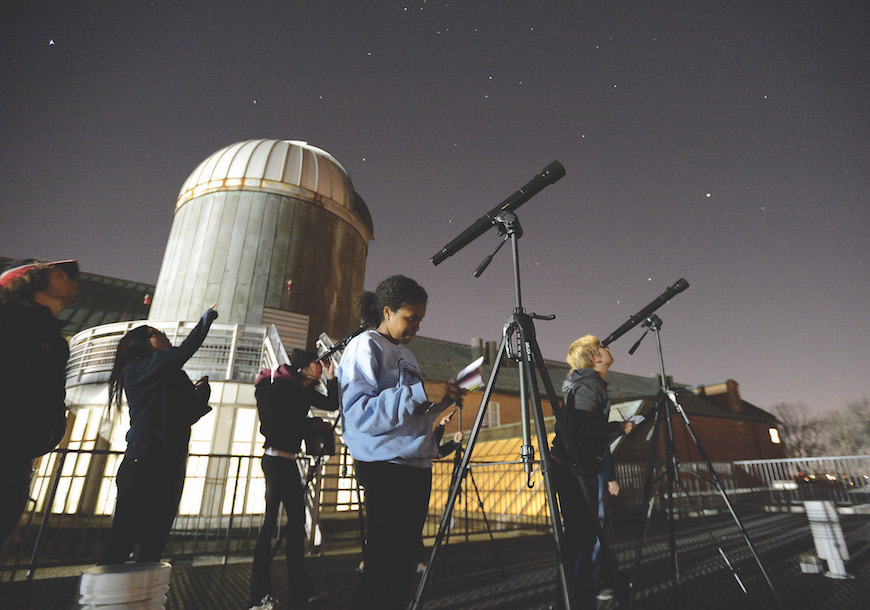
An essay by Deborah Weidman
Bloomberg Scholar
I started watching Star Trek with my dad in elementary school. I was 12 years old by the time we got to Voyager, and what began as a simple father-daughter tradition suddenly opened my eyes to a career, lifestyle, and journey I never would have expected to learn about from a TV show.
The moment Captain Kathryn Janeway stepped on screen, my impressionable middle-school self was confronted with a confident, intelligent, witty, and level-headed female leader in STEM, with red hair just like my own. Seeing this role model at such a critical age immediately shielded me from any doubts about being a female who wants to pursue engineering. If Janeway could do it, why couldn’t I?
Which is why, six years later, I cannot believe that not only am I attending my dream school, but that I have an opportunity to connect with Bloomberg Distinguished Professor Sabine Stanley, a leading planetary physicist, whose love for space was also sparked by Star Trek. When I discovered Professor Stanley, I was completely inspired by her research, career experiences, and outreach to increase the representation of women and minorities in STEM fields.
Coming to Hopkins as a biomedical engineer, I knew that I wanted to learn how to solve biological problems. My childhood interest in space, however, returned when I discovered that Hopkins offers a minor in space science and engineering. I realized I could combine my interests in engineering, biology, and space by building the biological systems on spacecraft or new planets, or investigating if there is other life out there in space.
The Bloomberg Scholars program, supported by a transformational gift from alumnus, philanthropist, and three-term New York City Mayor Michael R. Bloomberg, Engr ’64, provides need-based financial aid for undergraduate students, ensuring that the most talented and driven students are admitted, regardless of economic circumstance.
Today, our undergraduates are enjoying an enriched student experience that provides a crucial balance to the classroom, library, and lab — an experience that not only strengthens their personal and professional development, but also helps rank Johns Hopkins as a top destination for the great students of tomorrow.
Thanks to your generosity, and in support of the president’s Ten by Twenty goal of creating one of the top undergraduate experiences in the country, we are seeing:
- An unprecedented investment in the humanities at Johns Hopkins;
- More opportunities for student research in a variety of fields, ranging from environmental engineering to Alzheimer’s research;
- New athletic fields, facilities, and equipment to support our student-athletes;
- Grants and internships to foster student entrepreneurship;
- Even more extensive career service and mentorship opportunities.
Applied Curiosity
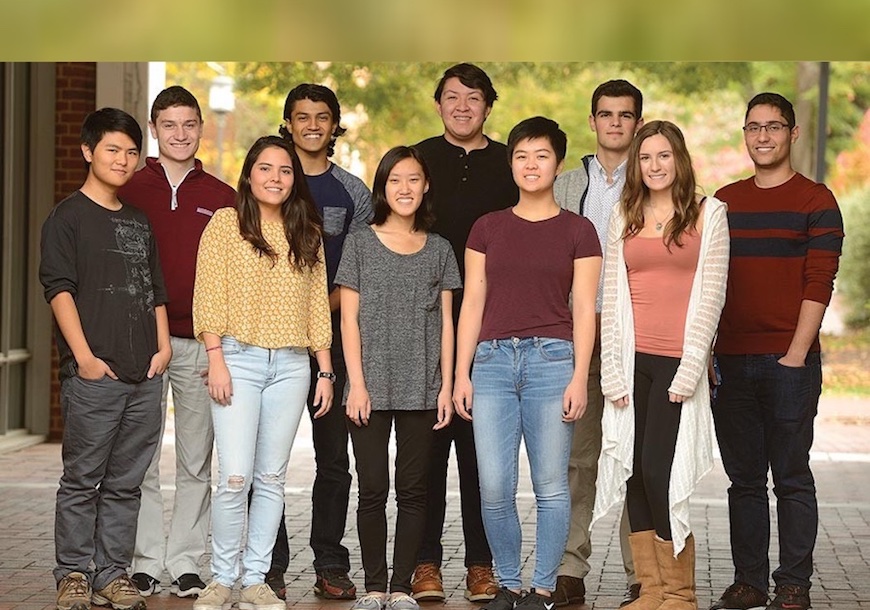
As a child, Sindhu Banerjee, a member of the Class of 2020, wouldn’t just tinker with toys — he would disassemble them. He’d fiddle with their batteries and circuits, figure out how they worked, then challenge himself to put it all back together.
His curiosity led him to an internship at a Boston hospital while he was still in high school. There he learned how tech intersects with health care by updating patient prescriptions in electronic health record software and using tools to monitor the oxygen saturation of patients’ blood. The experience convinced him to apply his love of math and engineering to a career in medicine. In his acceptance letter from Johns Hopkins, he learned he would get some help reaching that goal: He was one of 10 incoming students chosen for the inaugural class of Clark Scholars.
The Clark Scholars Program was established with a $15 million gift to the Whiting School of Engineering from the Clark Charitable Foundation. It was the largest endowed scholarship gift ever given to the school. The program attracts talented engineering students by providing financial aid and preparing them for leading roles in engineering and business.
The undergraduate scholarship program would offer Banerjee not only a first-class biomedical engineering education but also leadership training, community service opportunities, business management and entrepreneurial skills development, and a community of students who share his interests. “The opportunity to be part of such a small, select group that focuses on entrepreneurship and hands-on business experience was too good to pass up,” he says.
Now, I’m in a position to be a voice of reason for resources, projects, and programs I'm so proud of. I feel tremendously grateful to give back to my community."
Fueling a Personal Passion with Professional Prowess
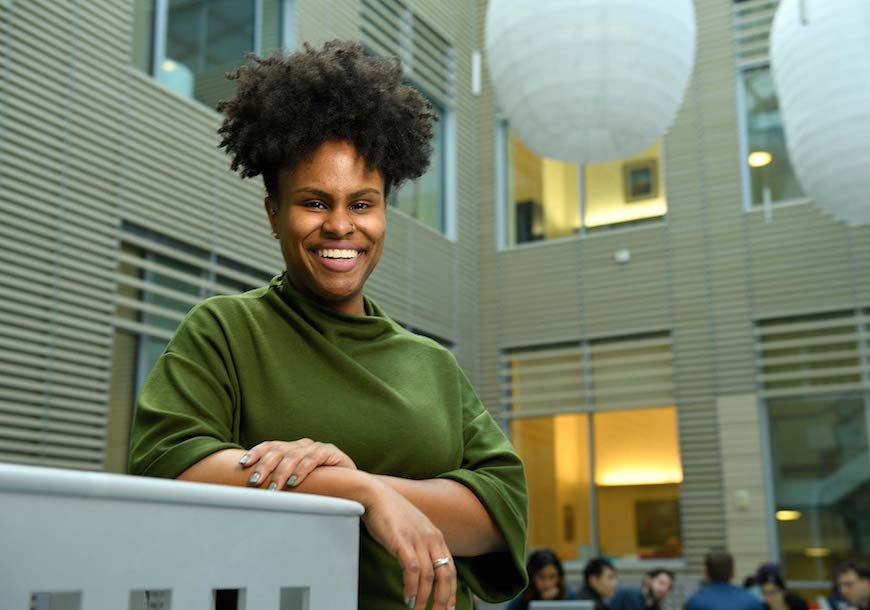
Brooke-Logann Williams, A&S ’15, went to high school 10 minutes from the Homewood campus and attended Johns Hopkins with support from the Baltimore Scholars Program — an initiative that reflects the university’s long-standing investment in Baltimore’s students and schools by providing full-tuition scholarships to any admitted graduates of city public schools.
When the first-generation college student stepped onto campus, she was excited at the opportunity of finding activities that truly suited her. One was the Community Impact Internship Program. Established through a gift from chair of the university’s Board of Trustees Jeff Aronson, A&S ’80, Parent ’13 and ’15, and his wife, Shari, the program offers paid internships with local nonprofit organizations or government agencies. Williams tutored juvenile offenders in the Baltimore City Detention Center and worked with the Office of the Public Defender.
“I was able to dive into the kind of grassroots work I really enjoyed,” she says. “I knew, more than anything, that I had a passion for that work. But I also knew I had to push myself, to learn more so I could better serve the nonprofits I’d come to know and love.”
Today, she’s managing a private family foundation, the J.S. Plank and D.M. DiCarlo Family Foundation, at an investment firm. “I gained a lot of nonprofit experience at Hopkins,” she says. “Now, I’m in a position to be a voice of reason for resources, projects, and programs I’m so proud of. I feel tremendously grateful to give back to my community.”
Saving Memories
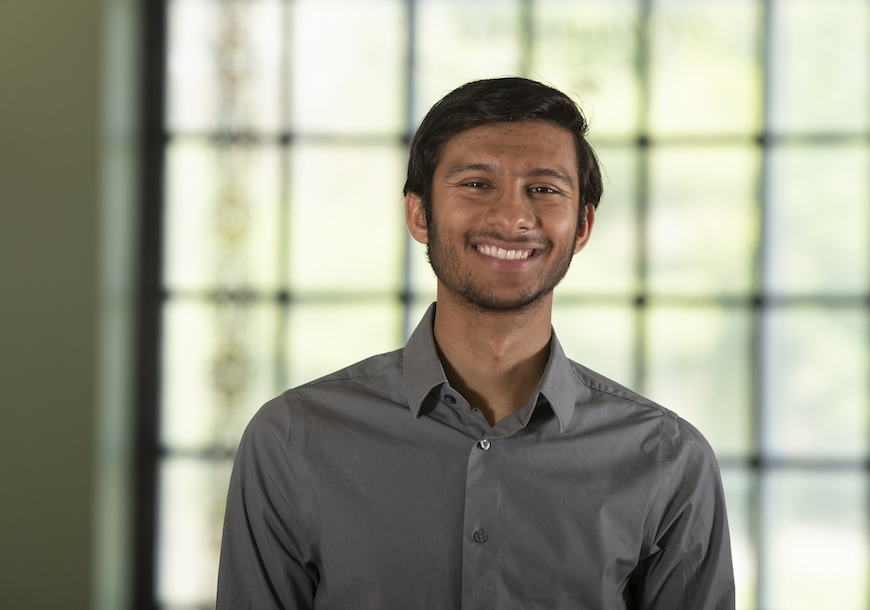
In high school, Ansh Bhammar, A&S ’18, spent his summers playing catch, taking walks, reading, and doing puzzles as a recreational therapy volunteer at a Boston VA hospital. He worked with Alzheimer’s patients, listening to their stories and witnessing firsthand the cognitive effects of their degenerative and fatal diagnosis.
“They wouldn’t remember me or my face, and I would always have the same conversation with the same people,” Bhammar remembers. “They’d be happy to see a new face even though they’ve been seeing me every day for two months.”
Those summers sparked Bhammar’s interest in seniors, and, combined with a long fascination of the human brain, inspired his time as a Johns Hopkins undergraduate student.
As the Albstein Undergraduate Research Scholar in the Krieger School of Arts and Sciences, Bhammar had the opportunity to conduct research with Krieger-Eisenhower Professor of Psychology and Neuroscience Michela Gallagher, PhD, a pioneer in neuroscience who has not only advanced the field through her research, but has mentored young scientists on the importance and rewards of studying it, too.
Bhammar was part of a team investigating how the firing of neurons in the brain is connected to the progression of Alzheimer’s, the sixth leading cause of death in the United States.
“In receiving support from the Phyllis F. Albstein Fund, I’ve really been able to accelerate the pace at which my research project has taken place,” he says.
In addition to receiving support through the fund created by Andy Albstein, A&S’78, member of the Krieger School Dean’s Advisory Board, Bhammar also benefited from annual fund support as a Woodrow Wilson Undergraduate Research Fellow and through the Ralph S. O’Connor Undergraduate Research Fund, which helped him launch his startup company, an online platform that connects undergraduate students with research opportunities and supports interdisciplinary faculty collaboration.
“I wanted to come to Johns Hopkins because of the focus on research and mostly the focus on taking undergraduate research to the next level,” Bhammar says. “As an undergraduate, it’s been an incredible experience, a truly rewarding journey not just in an academic sense, but to also create and foster lifelong and meaningful relationships with people here.”
"I'd say thank you. But it's more than that."
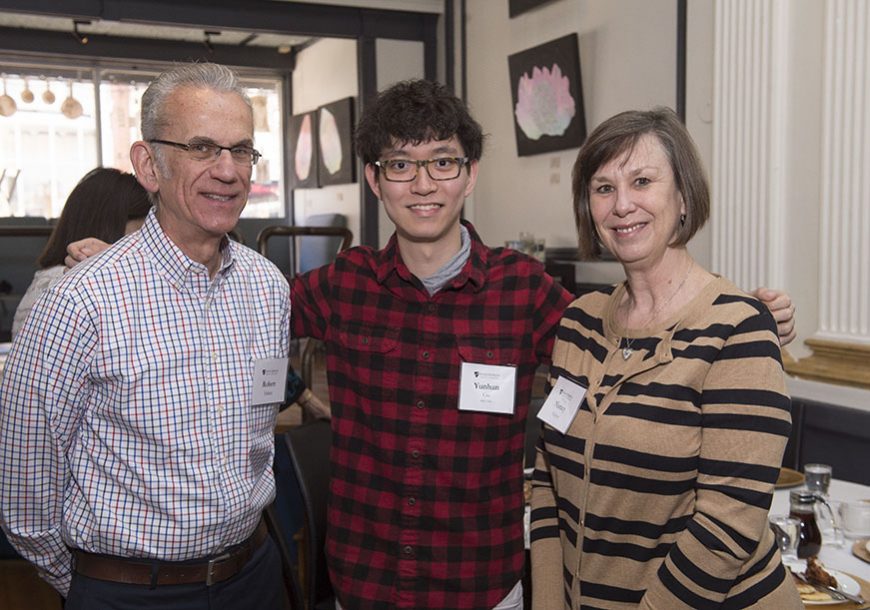
As Truitt Sunderland approached his 12th birthday, he asked his friends for unusual gifts: donations to a scholarship fund honoring Jeremy Huber, a first-year Blue Jays lacrosse player who died after suffering from complications of the flu.
“I thought how hard Jeremy worked to get to Johns Hopkins, and him not being able to play one single game, I think that is just terrible,” Sunderland said in 2015, just after his 12th birthday.
Inspired by the $400 donation from Sunderland and his friends, more than 140 individuals made gifts from $5 to $30,000 to the Jeremy Huber #19 Memorial Endowed Scholarship Fund, which supports a piano student at Johns Hopkins’ Peabody Institute
“I made Jeremy and his younger brother start piano when they were very young, and Jeremy played all through high school,” Jeremy’s mother, Nancy Huber, says. “Music is an important part of our life, was an important part of Jeremy’s life — either listening or playing it. He could name every performer; no matter the genre, he knew the history of that music.”
Nancy and Bob Huber met the first scholarship recipient, Yunhan Gu, in 2017. Now in his fourth year at Peabody, he is still thankful for Truitt’s gift.
“Peabody has a very high reputation in China, and being able to audition for Peabody is an honor. But the cost of international tuition, and other costs like travel, is high,” Gu says. “[t] was so kind of the kids to start this scholarship that will help not only me but others to follow their dreams in music. I’d say thank you, but it’s more than that. It makes me want to study harder, to meet those expectations, to live up to this scholarship. I don’t want to just be the recipient of the scholarship, but to share it as a teacher and a pianist — to use music to encourage other people.